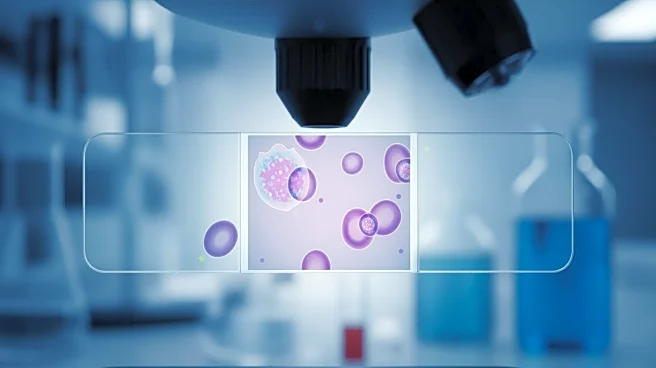What's Happening?
A recent study published in the Journal of Medical Virology has identified microscopic abnormalities in the blood of long COVID patients, which may help explain the persistent symptoms associated with
the condition. The research, led by Dr. Alain Thierry from Montpellier University, discovered that long COVID patients exhibit a high presence of microclots and neutrophil extracellular traps (NETs). These substances, while naturally occurring, become harmful when they accumulate excessively, disrupting blood flow in small vessels, particularly in the brain, muscles, and lungs. The study utilized advanced imaging techniques to analyze blood samples from 50 long COVID patients and 38 healthy individuals, finding that microclots were nearly 20 times more abundant in those with long COVID. The findings suggest that these blood abnormalities could serve as novel diagnostic markers and therapeutic targets for long COVID.
Why It's Important?
The discovery of these blood abnormalities in long COVID patients is significant as it provides a potential explanation for the lingering symptoms that have puzzled scientists and affected millions worldwide. By identifying microclots and NETs as key factors, the study opens new avenues for diagnosis and treatment, potentially leading to more effective management of long COVID. This research could transform how long COVID is diagnosed, moving from symptom-based assessments to blood-based tests, and pave the way for targeted therapies that address the underlying blood abnormalities. The implications extend to improving patient outcomes and reducing the burden on healthcare systems by providing clearer diagnostic criteria and more effective treatment options.
What's Next?
Further research is needed to confirm the causative role of these blood abnormalities in long COVID and to develop reliable diagnostic tests and treatments. Future studies will likely focus on understanding the mechanisms by which microclots and NETs contribute to long COVID symptoms and exploring therapeutic interventions that can dissolve these structures. The potential development of a blood-based diagnostic test could revolutionize the screening process for long COVID, allowing for earlier and more accurate detection. Additionally, clinical trials may be conducted to test new treatments aimed at breaking down these resistant blood structures, offering hope for relief to those suffering from long COVID.








